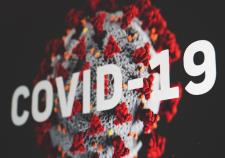Concern over SARS-COV-2 Variants
|
12/29/2020 |
 |
With the increased frequency of sequencing isolates of SARS-CoV-2, the virus responsible for COVID-19 in many nations, it is apparent that mutations are occurring that enhance infectivity. Mutations may affect response to antibody therapy and effectiveness of a range of vaccines based on mRNA, adenovirus-vectors and nanoparticle subunit technology.
The variant VOC (variant of concern) 202012/01 also termed variant B.1.1.7, and a similar variant in South African both carry mutation N501 that enhances infectivity. The UK variant has acquired 17 mutations affecting both the spike protein and nucleoprotein. The concurrent N501mutation increases the ability of the virus to bind to human ACE receptors. The mutation in this variant was recognized in early September in the U.K. but since November has become the predominant virus in Southeast England accounting for 60 percent of infections.
|
|
A variant with the 69-70 del mutation involves deletion of two amino acids allowing the virus to be refractory to an immune response. This change is also observed in the variant mink virus first identified in Denmark. Mutation P681H occurs at the cleavage site of the spike protein and may be associated with increased pathogenicity. Insertion of basic amino acids at the cleavage site of the hemagglutinating surface protein of avian influenza viruses is associated with increased pathogenicity relating to the ability of the virus to enter host cells. It has yet to be shown that the variants carrying P681H are in fact more pathogenic in humans.
|

Dr. Anthony S Fauci |
|

Dr. William Haseltine
|
An observation of concern is that where sequencing studies are carried out on a routine basis, variants are documented with increasing frequency. The U.K. variant is now present in France and Belgium despite border and travel restrictions imposed in late December that basically represented closing the stable door after the horse had bolted. Simultaneous emergence of variants in the Republic of South Africa and Nigeria, apparently showing greater infectivity reflect the innate ability of single-stranded RNA viruses to undergo mutations many of which are beneficial to the pathogen through infecting a greater number of hosts. |
|
Dr. William Haseltine, president of Access Health International, a think tank, formerly a Professor at Harvard Medical School and a renowned educator, author and philanthropist, correctly notes that COVID-19 in various forms may be with us for many years to come. This will be despite the adoption of vaccines directed against the spike protein of the virus. He notes that the mRNA vaccines including the Pfizer and Moderna products that received emergency use authorization in December in addition to the adenovirus vector vaccines including the AstraZeneca-Oxford and the Sputnik-5 product from Russia are all directed against spike protein. In contrast, China has developed vaccines based on inactivated whole virus that may in the long term be more effective in suppressing SARS-COV-2 by stimulating a broader antibody response.
In past weeks, studies of the sequences of SARS-COV-2 have disclosed a lack of information regarding the molecular composition of current viruses in circulation. The number of sequence assays of isolates in the U.K. is infinitely higher than in the U.S. Accordingly we have yet to detect the altered viruses that in all probability are undergoing community spread. The proportion of 0.5 percent of isolates sequenced the U.S. compares unfavorably with the U.K. with a rate of five percent. Of isolates from patients Information on the virus strains present in sub-populations allows health authorities and epidemiologists to identify the emergence of variants and their mode of transmission. The need for greater surveillance of isolates from patients using a structured program is advocated by Dr. Anthony S. Fauci, Director of the NIAID -NIH. His promotion of sequencing isolates is justified by the December 29th recognition of the U.K. variant in a patient in Colorado with no history of travel, suggesting community transmission.
The expedient of requiring a negative PCR or antigen assay for intended visitors to the U.S. is at best a “feel-good” measure since an air traveler with a negative test conducted three days before entry to the U.S. may still permit introduction of a variant of SARS-COV-2.as has occurred in Canada. Without detailed and structured sequencing, we do not know whether variants carrying the N501 and P681H mutations are in fact present in the U.S. and are undergoing community spread. We do not have adequate information on how U.S. variants are emerging nor have we monitored possible changes in infectivity and pathogenicity. Hopefully additional funding will be available through the Covid relief package to be assigned by the incoming Administration.
With recognition of a similar variant in the U.S. this past week we can expect that community transmission during Christmas travel will have disseminated this strain widely. It is only the dearth of sequencing assays that has failed to reveal the problem of emerging variants. "Seek and ye shall find" is the applicable catchphrase.
|

|
|
|